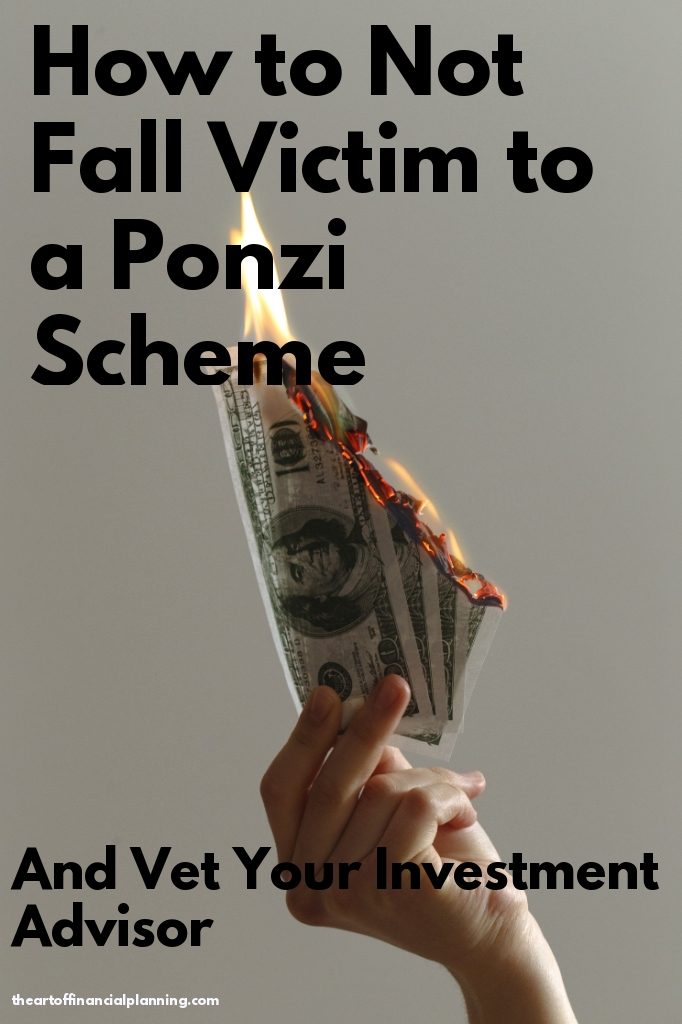
The fall of 2008 was a one-two punch for investors, and boy did they get a black eye. The mortgage bubble finally burst, sub-prime lending had caused massive debt holdings for banks that stopped receiving payments which put America’s largest banks in a perilous position which needed government intervention to bail them out, and the stock market tanked in the most prolific crash ever (including the Great Depression). When skittish investors began to withdraw their investments in droves, then news broke that one of New York’s most trusted financial advisors, Bernie Madoff, had been running a multi-billion dollar ponzi scheme wherein he took investor money and failed to invest it as promised, instead forging account statements and paying out funds to clients from other clients’ investments. What a time to be alive.
If you are afraid to work with an investment advisor because you are afraid of getting scammed by the next Bernie Madoff, you are not alone. But choosing to go it alone or relying on investing robots and algorithms will most likely leave you with less money in your pocket anyway because of missed planning opportunities. Not because you got swindled, but because your money didn’t work for you as hard as it could have. Working with an investment advisor who is looking out for you and your money is like hiring a personal trainer who knows all the right moves to help your money work as hard as it can. Choosing an investment advisor doesn’t have to be a scary process. Knowing how to vet an investment advisor is crucial to assuage your fears and invest confidently.
Look For a Fiduciary and Check their License
Investment advisors have a fiduciary duty and are legally bound to act in the best interest of their client, not so with stockbrokers and some financial advisors, so be sure you know who you are working with. Check that they are licensed with the SEC and with the securities regulator in your state. FINRA also has a good site to check out your broker or advisor. Working with a fiduciary like an investment advisor lets you know that they are advocating for your best interests, not working to line their pockets.
Check for Adverse Actions
The SEC has an easy to use Action Lookup tool that can vet your investment advisor and tell you if they have been named as a defendant in SEC federal court actions or as a respondent in SEC administrative proceedings. The database only goes back to 2010 and there is a few month delay for new actions to get uploaded into the system but it will still give you a peek into the SEC’s files.
Ensure the Investment Vehicle is Registered
Check the SEC’s EDGAR tool to see if the investment vehicle your investment advisor recommends is registered with the SEC. If the advisor won’t give you enough information on the fund that you can do your due diligence, that is a red flag.
Interview Several Advisors for the Job
You are looking for someone who will be a good fit for you, that you trust, and that has a proven investment track record. Sit down with a handful of advisors and get to know them personally. This is someone you will entrust with your financial future, so don’t just read their brochure and sign over your life savings. Take your time to do your due diligence.
Look for Transparency
A secretive investment advisor who does not attempt to educate you and explain their investment strategy for your funds should be a hard pass. If your advisor suggests a certain investment, they should be able to clearly articulate why it is a good choice for you. Advisors are there to advise, educate, and inform you. If you cannot understand how your funds are being invested or they are attempting to move you into a risk level you are not comfortable with, move on.
If It’s Too Good to Be True, It Usually Is
Anyone that guarantees a return on your investment is throwing up a huge red flag. Same with very steady returns that do not mirror the market, a la Madoff. No losses or statistically low losses that don’t mirror the market should be a red flag. All ships drop at low tide, and your investment advisor knows this and shouldn’t attempt to hide it. Ask for a fund prospectus and review their monthly returns over the last few years to look for average returns and variations that generally follow the market.
Look For a Personal Approach
Ask your advisor what their specialty is, whether they have a lot of clients like you, what their minimum investment is, and their fee schedule. Your advisor should craft an investment strategy that suits your needs and goals, whether that is caring for a loved one with an illness, planning to retire by 35, or putting all your kids through college before you travel the world in your retirement. Whatever your plan, your advisor should look for an investment strategy that works for you and your specific goals.
The fear of being taken advantage of and fear of falling victim to a ponzi scheme doesn’t have to impede your financial success. Taking these steps to help you find and vet the best investment advisor for you will help you avoid scams and find the right person to guide you in your financial planning and investment journey.


